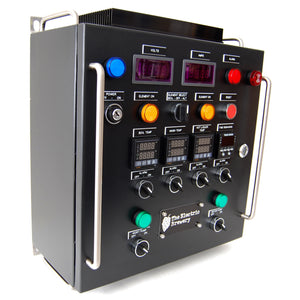Munich Helles
 Munich Helles brewed by @dan.calzaretta on our Electric Brewery setup
Munich Helles brewed by @dan.calzaretta on our Electric Brewery setup
Testimonials
"I brewed your Munich Hells and it's the best beer since drinking Augustiner in Munich years ago. I have drunk beer all over Germany and this is as close as it gets. Fermentation was 12 days at 54F and two days rest, ABV is 5.2%. I have one corney lagering at 34 but started drinking the other almost immediately, after a week it was crystal clear and so typical of German lagers. Thanks for the recipe Kal." - Al F., Little Dog Brewery
"Kal, Just wanted to say that you are a Legend. I'm an Australian brewer of a couple of years doing brew in a bag and building my soon to be commissioned electric kettle using so many ideas from your website. Thank you. I have tried a few of your recipes and of any recipe I have done, your ones always turn out first time every time and they are superb. I have done two batches of the Electric Pale Ale (beautiful), one IPA, Bohemian Pilsner and just recently have tried the Munich Helles and it is unbelievable! Thanks for all the help and inspiration. Very Happy. PS, can't wait to eventually see the recipe for the NZ IPA!" - hpalmowski
"Wow, this is a beautiful beer. It's got that German character and it hits you in the nose and in the palate. It is malty, with great noble hops, a beautiful white fluffy head, it is very very clean, and finishes nice and crisp! Everyone here loves it!" - jcav
"This recipe is definitely a winner! I brewed 12 gallons and half of it was gone before I was done lagering."- ddc69
"I brewed the Munich Helles and just put it on tap this past weekend and it was a HUGE hit with the non craft beer drinking crowd... very clean."- Jerz
"Graduation party in the back yard today, luckily I had ten gallons of this in the lagering fridge. Although it was my first time making this recipe, well quite frankly my first time making a lager at all, and the batch was still 4 weeks short of what I'd have considered done....it was a huge hit! Thanks for sharing this one Kal! Looking forward to the next batch! - Mr Walleye
"I have to say, I am loving this recipe! It is especially good with Kal's Guinness clone on nitro layered on top as a black and tan!" - jonymac
"I just kegged my Helles and a sample was divine." - OkieDokie
"It's been a hit. People are demanding I make more, and now." - Master
"Another great recipe. This is my first attempt at brewing a Helles although I have drunk many. It is very close to the commercial beers I drank in Germany. I am currently 2 weeks into the low temp lagering and the beer is wonderful, I will probably not wait the 4-8 weeks normally suggested. The brew was meant to be for Oktoberfest but not sure it will last that long." - whistledown
Introduction
Munich Helles is a clean, malt-focused German lager with a gentle, bready malt character. It's a smooth, easy-drinking beer that is often consumed by the litre.
When the golden and clean lagers of Pilzen became all the rage in the mid-1800's, Munich brewers feared that Germans would start drinking the Czech beer instead of their own. This Helles style is essentially Germany's answer to meet the demand ("Helles" is German for "bright"). While a bit more malty, it shares the same spicy hop characters of Czech Pils, but at a slightly more subdued level that is more in balance with the malts.
Since the 1970s the most common beer served at Oktoberfest in Germany is not actually an Oktoberfest beer, but Munich Helles. Its lower alcohol level, less malty flavour, and lighter colour makes it more approachable.
Brew up a batch and let us know how you like it!
Munich Helles
Size: 12 US gallons (post-boil @ 68F)
Mash Efficiency: 95%
Attenuation: 78.2%
Calories: 167 kcal per 12 fl oz
Original Gravity: 1.050 (style range: 1.046 - 1.056)
Final Gravity: 1.011 (style range: 1.008 - 1.012)
Colour: 4.8 SRM (style range: 2 - 6)
Alcohol: 5.2% ABV (style range: 4.6% - 6%)
Bitterness: 19 IBU (style range: 15 - 25)
Mash:
18 lb German pilsner malt (1.5-2.1L) (91%)
1.5 lb Dark Munich malt (9L) (6.8%)
0.42 lb Melanoidin malt (23-34L) (2.2%)
Boil:
3 oz German Hallertau hops (4%) - added during boil, boiled 60 min [18.7 IBU]
1 Whirlfloc tablet (Irish moss) - added during boil, boiled 15 min
Yeast:
Wyeast 2308 Munich Lager yeast or White Labs WLP838 Southern German Lager yeast
(~844 billion cells or an equivalent starter)
Purchasing through our affiliate links helps support our site at no extra cost to you. We thank you!
Notes / Process
- Add 500mg potassium metabisulfite to 20 gallons water to remove chlorine / chloramine (if required).
- Water treated with brewing salts to our Balanced flavour profile: Ca=50, Mg=10, Na=16, Cl=70, SO4=70. (Hit minimums on Ca and Mg, keep the Cl:SO4 ratio low and equal. Do not favour flavour / maltiness or bitterness / dryness. For balanced beers.). For more information on how to adjust your water, refer to our step by step Water Adjustment guide.
- 1.5 qt/lb mash thickness.
- Single infusion mash at 149F for 90-120 mins.
- Raise to 168F mashout temperature and hold for 10 mins.
- ~90 min fly sparge with ~5.6-5.8 pH water (measured at mash temperature).
- Boil for 90 minutes, adding Whirlfloc and hops per schedule. Lid on at flameout, start chilling immediately.
- Cool the wort quickly to 50F (we use a one-pass convoluted counterflow chiller to quickly lock in hop flavour and aroma) and transfer to fermenter.
- Oxygenate the chilled wort to a level of 14 ppm dissolved oxygen. For more information refer to our Aerating / Oxygenating Wort guide.
- Pitch yeast and ferment at 50F (wort temperature). We use modified stainless fermenting buckets in wine fridges.
- Ferment until approximately 5 points from final gravity and then raise the temperature to 70-72F until finished. In our case we simply turn off the fermenting fridges and allow the beer to naturally rise to room temperature. Assume fermentation is done if the gravity does not change over ~3 days.
- Before packaging you may optionally rack to a brite tank (we use 5 gallon glass carboys) that has been purged with CO2 to avoid oxygen pickup, add 1 tsp of unflavoured gelatin dissolved in a cup of hot distilled water per 5 gallons of beer, and allow to clear for 2-3 days. In most cases we recommend skipping this step as the less you handle the beer and potentially expose it to oxygen, the better. The beer will drop brilliantly clear on its own during the conditioning period.
- Package as you would normally. We rack to kegs that have first been purged with CO2 and then chill to near freezing while carbonating at the same time in a 6-keg conditioning fridge. After ~1-2 weeks at serving pressure the kegs will be carbonated and ready to serve. In a hurry? Feel free to raise the CO2 pressure temporarily to 30-40 PSI to carbonate fast over a 24 hour period, and then turn back down to serving pressure.
- Carbonate this beer to around 2.5 volumes of CO2.
- This beer will improve greatly if conditioned just above freezing for at least 4 weeks before serving (6-8 weeks is better). Avoid keeping the beer unrefrigerated for extended periods. It will remain clean and crisp for months if kept near freezing.
For detailed brewing instructions, see our Brew Day Step by Step guide.
Enjoy!
Questions? Visit our Munich Helles forum thread.
Pictures / Videos
Interested in seeing what we're brewing right now? Follow us on Instagram for pictures and videos of our brewing activities as they happen.





